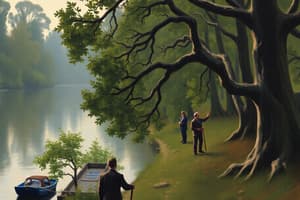Podcast
Questions and Answers
What is measured by assessment tools in learned curriculum?
What is measured by assessment tools in learned curriculum?
Cognitive, affective, and psychomotor outcomes.
Which of the following is NOT an influencing factor of the hidden/implicit curriculum?
Which of the following is NOT an influencing factor of the hidden/implicit curriculum?
- Peer influence
- Cultural practices
- Test scores (correct)
- School environment
Who among the following is considered a significant curricularist?
Who among the following is considered a significant curricularist?
- John Dewey (correct)
- Isaac Newton
- Albert Einstein
- Galileo Galilei
What does a curricularist do?
What does a curricularist do?
Which role of the teacher involves keeping records of knowledge concepts?
Which role of the teacher involves keeping records of knowledge concepts?
In curriculum development, the phase that considers the school vision, mission, and goals is called ______.
In curriculum development, the phase that considers the school vision, mission, and goals is called ______.
The taught curriculum is influenced solely by the written curriculum.
The taught curriculum is influenced solely by the written curriculum.
What is the meaning of 'curriculum'?
What is the meaning of 'curriculum'?
Which curriculum includes documents like syllabi and instructional guides?
Which curriculum includes documents like syllabi and instructional guides?
What are the four phases of the curriculum development process?
What are the four phases of the curriculum development process?
Flashcards are hidden until you start studying
Study Notes
Learned Curriculum
- Measured by assessment tools to assess cognitive, affective, and psychomotor outcomes.
- Demonstrates higher-order and critical thinking skills.
Hidden/Implicit Curriculum
- Not deliberately planned but significantly impacts learner behavior.
- Factors influencing the hidden curriculum:
- Peer influence
- School environment
- Media
- Parental pressures
- Societal changes
- Cultural practices
- Natural calamities
The Teacher as a Curricularist
- The teacher plays a crucial role in implementing and enhancing the curriculum.
- Historically, "curricularist" referred to individuals creating curriculum theories.
- Key influential curricularists:
- John Dewey
- Hilda Taba
- Ralph Tyler
- Franklin Bobbit
- Curricularist: a person involved in various aspects of the curriculum, including knowing, writing, planning, implementing, evaluating, innovating, and initiating.
Roles of the Teacher
- The classroom is the primary site for curriculum engagement.
- The initial school experience shapes students' understanding of schooling through interactions between the teacher and learner.
Diverse Roles of the Teacher
- Knows the Curriculum (KNOWER): Learning starts with understanding the curriculum, subject matter, or content.
- Writes the Curriculum (WRITER): Records knowledge concepts, subject matter, or content.
- Plans the Curriculum (PLANNER): A well-structured curriculum requires planning, including yearly, monthly, and daily plans.
- Initiates the Curriculum (INITIATOR): Teaches new curricula recommended by educational agencies like DepEd, CHED, TESDA, UNESCO, INICEF, etc.
- Innovates the Curriculum (INNOVATOR): Teachers are encouraged to be creative and innovative, adapting the curriculum to meet changing needs.
- Implements the Curriculum (IMPLEMENTOR): The teacher puts the curriculum into action in the classroom.
- Evaluates the Curriculum (EVALUATOR): The teacher assesses the effectiveness of the curriculum and determines if desired learning outcomes are achieved.
The School Curriculum: Definition, Nature, and Scope
- Curriculum: A planned and guided set of learning experiences designed to help learners develop personal and social competence.
- Documented Curriculum: A written document outlining goals, objectives, content, learning activities, and evaluation procedures.
- Subject Content: The content of a subject, concepts, and tasks to be acquired, planned activities, desired learning outcomes and experiences, product of culture, and agenda for social reform.
- Experiential Curriculum: Includes all the experiences learners have in an educational program.
- Programmed Activities: Planned set of activities (by teachers and students) designed to achieve educational objectives.
- Plan for Learning: A plan that consists of learning opportunities for a specific time frame and place.
The Teacher and the School Curriculum
- Curriculum originated from the Latin word "curricula," meaning "course of study."
Curricula in Schools
- Recommended Curriculum: Established by educational authorities like DepEd, CHED, TESDA, UNESCO, and other organizations.
- Written Curriculum: Includes documents like syllabi, modules, books, and instructional guides.
- Taught Curriculum: How the curriculum is actually implemented in the classroom.
- Supported Curriculum: Consists of materials and resources used for learning, including print materials, non-print materials, and facilities.
- Assessed Curriculum: Evaluated to determine the effectiveness of the curriculum.
Traditional and Progressive Views of Curriculum
- Robert M. Hutchins: Emphasized "permanent studies," such as grammar, reading, rhetoric, logic, and mathematics.
- Arthur Bestor: Focused on intellectual training in grammar, literature, and writing.
- Joseph Schwab: Believed that curriculum should encompass knowledge from various disciplines.
- Philip Phenix: Argued that curriculum should be based entirely on knowledge from different disciplines.
- John Dewey: Emphasized that education is an experience.
- Holin Caswell and Kenn Campbell: Saw curriculum as all experiences students have under the guidance of teachers.
- Othaniel Smith, William Stanley, and Harian Shore: Viewed curriculum as a sequence of experiences for disciplining students in group thinking and acting.
- Colin Marsh and George Willis: Considered curriculum to be all planned and enacted experiences in the classroom.
Approaches to the School Curriculum
- The Curriculum as Content or Body of Knowledge: Focuses on transmitting knowledge to students.
- The Curriculum as a Process: Views curriculum as an active, dynamic process involving interaction among teachers, students, and content.
- The Curriculum as a Product: Represents the desired learning outcomes students achieve.
Curriculum as Content or Body of Knowledge
- Topical Approach: Focuses on knowledge, with experiences included.
- Concept Approach: Focuses on concepts and their relationships.
- Thematic Approach: Combines concepts to develop conceptual structures.
- Modular Approach: Organizes content into complete units of instruction.
Criteria for Selecting Content
- Significance: Content should contribute to the overall goals of the curriculum.
- Validity: Content should be accurate and relevant.
- Utility: Content should be useful to learners.
- Learnability: Content should be appropriate for the learners' developmental level.
- Feasibility: Content should be teachable within the available time and resources.
- Interest: Content should be engaging and relevant to learners.
Content Guidelines
- Relevance: Content should be valuable and useful to learners.
- Integration: Content should be linked to other disciplines.
- Appropriateness: Content should align with the learning needs of learners.
BASICS: Fundamental Principles for Curriculum Content
- Balance: Content should be distributed across different areas of study.
- Articulation: Curriculum content should be interconnected and build upon previous learning.
- Sequence: Content should be presented in a logical order.
- Integration: Content should be connected to different disciplines.
- Continuity: Curriculum should provide a consistent flow of learning.
- Scope: Curriculum should cover a wide range of topics.
Curriculum as a Process
- Pedagogical Content Knowledge (PCK): Connects curriculum with content.
- Three Aspects of Curriculum Process: 1.Instruction 2.Implementation 3. Teaching
Curriculum Development Processes and Models
- The curriculum is a dynamic process, with ongoing efforts to improve.
- Four Curriculum Development Phases:
- Curriculum Planning: Considers the school's vision, mission, and goals.
- Curriculum Designing: Outlines the overall structure of the curriculum.
- Curriculum Implementation: Putting the curriculum into action in the classroom setting.
- Curriculum Evaluating: Assesses the effectiveness of the curriculum.
Curriculum Development Process Models
- Ralph Tyler Model: Emphasizes four basic principles:
- Determining Objectives: Establishing clear learning goals.
- Selecting Content: Choosing relevant content that aligns with objectives.
- Organizing Experiences: Designing learning activities that facilitate learning.
- Evaluating Outcomes: Assessing student learning against the objectives.
- Hilda Taba Model: A more inductive approach focuses on student experiences.
- Diagnosis of Needs: Identifying the needs and interests of learners.
- Formulation of Objectives: Developing learning goals based on learner needs.
- Selection of Content: Choosing content that aligns with objectives.
- Organization of Content: Structuring content in a logical manner.
- Selection of Learning Experiences: Designing learning activities to achieve objectives.
- Evaluation and Revision: Continuous evaluation and improvement.
- **
- **Please note: This is a comprehensive summary of the text. It would be best to refer to the original source or other curricular resources for a thorough understanding of the concepts and their applications. ***
Studying That Suits You
Use AI to generate personalized quizzes and flashcards to suit your learning preferences.




